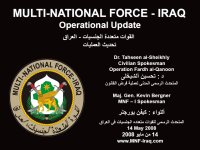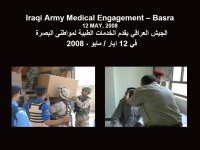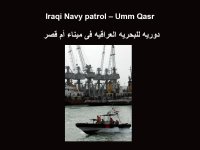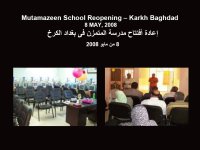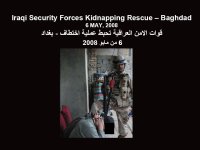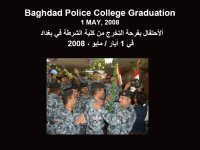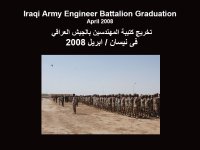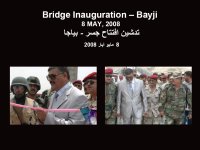
PRESS CONFERENCE: Security, Reconstruction: Maj. Gen. Bergner, Dr. al-Sheikhly, May 14, 2008
Multi-National Force-Iraq
Wednesday, 14 May 2008
Dr. Tahseen al-Sheikhly, Civilian Spokesman for Operation Fardh al-Qanoon, and Maj. Gen. Kevin Bergner, Spokesman for MNF-I, discuss services in Baghdad and security and reconstruction operations around Iraq.
PRESS CONFERENCE:
Major General Kevin J. Bergner, Spokesman, Multi-National Force – Iraq
Dr. Tahseen al-Sheikhly, Civilian Spokesman, Operation Fardh Al-Qanoon
DATE: May 14, 2008
TRANSCRIBED BY: SOS INTERNATIONAL LTD.
PARTICIPANTS:
Major General Kevin Bergner
Dr. Tahseen al-Sheikhly
REPORTERS:
Ahmed Jassem from Arabiya TV
Unidentified reporters from Biladi TV, Al Huriya TV, Nina Agency, and Aswath[ph] Iraq Agency.
REPORTERS 1-12
*REP1 = REPORTER 1
DR AL-SHEIKHLY: [Speaks in Arabic.]
INT: We are happy today to meet you and talk about what’s going on in Baghdad in particular and also about the activities and the operations of the Multi-National Forces which will…General Bergner will talk about this. Now the major point is what the operations…what the command operations in Baghdad are giving to the people in Baghdad and Sadr City on the humanitarian level. We take care of this issue and instructions from Prime Minister Maliki for all the security ministries. And there are instructions to exert exceptional efforts to help the citizens of Sadr City. Twenty-seven trucks loaded with food entered Sadr City ever since May 5th until May 13. Also, four vehicles from the Ministry of Health entered the city loaded with also medicine. Thirteen vehicles from the Ministry of Oil carrying gas and oil in addition to six vehicles carrying gas canisters also were distributed. And the food rations were also distributed in Sadr City with cooperation with the coalition forces on May 4th. Representative of the services and the directories of the services are conducting continuous meetings with the civil-military humanitarian assistant in Sadr City. And in those meetings, they talk about providing humanitarian assistance to the people in Sadr City. Also, we distributed food in Fallah Street with cooperation with the coalition forces. And the food rations was distributed as well by the Ministry of Trade. We also distributed generators, building constructions, toys…give the childrens. Also we opened a clinic…health [clinic] in Al Salasit[ph] area which received several patients. And the same clinic or its center also food was distributed to the people. Another health center was also opened in the…at the entrance of Al Fallah Street which also received several patients from the area. In addition, we opened a center to provide compensations to the people of Sadr City who suffered from the military operations. And also we distributed building materials to the people. And there are also some campaigns to clean the streets. We opened a temporary health center which provides also healthcare and food for the citizens in Al Dahal[ph] Street. We also donated a 5 kv[sic] generator and 17 trucks today – loaded with oil as well – entered Sadr City. We are serious to provide all the humanitarian aids to the citizens in Sadr City in a way that provides them good living standards due to the control of the gangs and the criminal elements. My friend, General Bergner, will talk about the military operations conducted by the coalition forces. And then, after that, we will take your questions.
MAJ GEN BERGNER: Shukran jaziilan, Dr. Tahseen. Before discussing the latest events in Iraq, I would like to briefly address a misinterpretation of comments made last week about a large weapons cache that was found in Karbala by Iraqi security forces. Because of the great quantity of weapons in that particular weapons cache, some speculated that the find was connected to collections of Iranian weapons which we have found num-…and shown numerous times over the past 12 months. The story of the Karbala weapons cache and the previous reports of collections of Iranian-made weapons are not linked. They were not linked in our remarks last week and that was…we were very clear in our comments last week that specifically said that in our remarks. However, over the course of the last several months, we have publicly discussed numerous times and shown numerous times the evidence – on four separate occasions – of what we have found and continue to find: Iranian-made weapons in the hands of criminals in Iraq. We have also discussed what we have…we have also discussed the evidence that we have found that Iraqi militants are being trained in Iran and receiving funding through [the] Iranian Quds Force to conduct violent attacks in Iraq. We have highlighted these finds in public because they are an issue of influence and sovereignty related to how a neighboring country can support or undermine security and stability. With this evidence, the Government of Iraq has recently engaged its neighbor and again sought fulfillment of Iranian commitments previously made to stop the flow of weapons, training, and funding. Prime Minister Maliki has established a committee to collect and analyze the reports of Iranian activity and to develop a unified approach. We will continue to provide information and evidence we have collected to the Government of Iraq to be considered along with their own evidence from the Iraqi security forces. As coalition forces, we will continue to fulfill our commitment under the United Nations mandate, together with our Iraqi partners, to support the Government of Iraq’s efforts to improve security and stability. Iraqi and coalition forces continued to see progress this past week in the establishment of security and enforcement of the rule of law. And I’ll briefly update…provide an update on the current operations in Basra, Baghdad, and Mosul. In Basra, Operation Sawlat al-Fursan, Charge of the Knights, continues focusing on the removal of illegal weapons and providing assistance to local citizens. As the Iraqi security forces secure neighborhoods and areas formerly controlled by criminals, they continue to arrest outlaws and uncover caches of illegal weapons – many of which we know, and Iraqi security forces have identified, as Iranian weapons of origin. The Iraqi security forces are maintaining a strong presence in these parts of Basra by setting up security stations and preventing the re-emergence of criminal networks. Clean up efforts are underway with approximately 3,000 local citizens hired to undertake this work. Nearly $60 million worth of long-term projects in the areas of health, municipal services, electricity, public communications, and youth activities have been prioritized for funding by the committees in Basra. This week, the 36th Iraqi Army Division, in conjunction with coalition forces, conducted a medical engagement in Basra’s Al Qibla District where they provided health services to local families in underdeveloped areas. Around the Port of Umm Qasr, the Iraqi Navy increased the weekly number of patrol boats by some 20% in the last week. The head of the Iraqi Navy met with his counterparts from the Kuwaiti Navy and Coast Guard to discuss ways of fostering closer cooperation and improving the ability of both countries to interdict illegal activities. Basra has much work ahead of it, but already residents are restoring their city and rebuilding their neighborhoods. Here in Baghdad, Operation Fardh Al Qanoon, Enforcing the Law, continues even as government and local residents are implementing projects to restore essential services, open businesses, build schools, and take care of streets and neighborhoods. In the Al Huriya area, over 150 businesses were represented at a small business seminar last week. Members of the neighborhood council presented information on microfinance loans and other programs and collected applications from the businesses that were in attendance. Also, the Mutamazin[ph] School for Gifted Students reopened last week. Closed for seven months, the school’s refurbishment was supported by the Iraqi and coalition forces to help children in the district receive a quality education. Last week, local authorities inaugurated the opening of the Ghazaliyah Public Works Substation. This substation will operate four more sewage trucks, six trash trucks, and other construction equipment to provide essential services for the district. However, not all of Baghdad’s districts are enjoying the same levels of security and opportunities for progress as you well know. Criminal violence continues to disrupt efforts by the Government of Iraq and coalition forces to restore services, encourage business development, and ensure the safety of schools and other municipal activities. Yesterday, Iraqi soldiers from the 9th Iraqi Army Division attempted to clear one of the routes in Sadr City in accordance with the agreement that was been…that had been agreed to between the United Iraqi Alliance and the Sadr political parties. After moving about a quarter of a mile, a roadside bomb detonated against their armored vehicle, a BMP in this case, and they were then engaged with small-arms fire. Last night air weapons teams had to engage three special groups criminals who were again emplacing another improvised explosive device in Sadr City. Coalition forces would welcome the cessation of attacks by criminal elements in and around Sadr City. These attacks have caused losses of life and considerable hardship for innocent Iraqis and seeing the attacks stop would be heartening. In Mosul, the Government of Iraq announced this week that the Ninawa Operations Command, led by Lieutenant General Riyadh, started a new phase of operations to counter the terrorist threats there. This phase has featured intensified operations by the Iraqi security forces and it is building on the operations that have been underway for the past several weeks. These Iraqi-planned, Iraqi-led operations have established bases and checkpoints in Mosul and have featured numerous raids on Al-Qaeda – Iraq cells that are using indiscriminate violence to intimidate, assassinate, and wound innocent people in the city. The operations continue to be closely supported by coalition forces. Since the beginning of Operation Lion’s Roar, Iraqi security forces report that they have detained some 500 terrorists and criminals. On Monday alone, Iraqi Army and coalition forces discovered four weapons caches with more than a dozen pipe bombs, improvised explosive devices, mortar rounds, and more than 200 pounds of explosive materials. And just yesterday, the Iraqi Army’s 3rd division discovered multiple al-Qaeda weapons caches including 600 pounds of explosives, two machine guns, and three mortar tubes. Much of the recent progress we have seen in Basra, Baghdad, and Mosul is due to the efforts of the Iraqi security forces. In recent weeks, Iraqi police stations in Al Kut [and] Yusufiyah in the Radwaniyah districts of Baghdad undertook security patrols to root out corruption, improve their police stations, and maintain focus on the…on enforcing the security in their districts. Last Wednesday, in the Suwayrah District of Wasit Province, the Iraqi Army conducted operations that resulted in the detention of 38 criminals, the seizure of 25 weapons, 8 cars, and the clearing of 11 improvised explosive devices. On Monday, northwest of Baghdad, soldiers from Iraq’s 1st Iraqi Army Division conducted a joint investigation with the Sons of Iraq [and] local Iraqi police to find a kidnap victim who was being held for ransom. Using police reports, information from the victim’s family, and tips from area residents, the Iraqi Army conducted a successful rescue operation, freeing the hostage, and capturing his assailants. Recent recruiting drives for Iraqi police and Sons of Iraq in Iskandariyah, Baghdad’s Al-Huriya, [and] Ninawa’s Tal Qif[ph] have shown hundreds of Iraqis from all communities volunteering to protect their country. In addition, at the beginning of this month, 479 new police officers graduated from a nine-month police training course at Baghdad Police College. This is in addition to more than 43,000 Iraqi Army enlisted soldiers who have graduated from basic combat training so far this year. In April, approximately 700 soldiers from the Iraqi Army’s Engineer Infrastructure Battalion completed six months of specialized training in electrical and pipeline repair and explosives ordinance disposal. Several of these graduates worked with coalition forces to build two floating bridges in Bayji and these bridges were inaugurated last week. The bridges restored travel between Salah ad Din and Kirkuk. The Iraqi security forces showed by this effort that they are not only improving security, but they are also providing reconstruction support to help local communities. Finally, to…the resolve of the Government of Iraq and the Iraqi security forces to enforce the rule of law is leading to progress in Basra, Baghdad, and Mosul. Many challenges and sacrifices are still ahead. And as the Iraqi security forces continue to gain the confidence of the Iraqi citizens and increase their capacity to sustain the hard-fought gains, the prospects for the future improve with each effort. That concludes our update and I’ll defer to Dr. Sheikhly…
DR AL-SHEIKHLY: Thank you.
MAJ GEN BERGNER: …to take your questions. Shukran jaziilan.
DR AL-SHEIKHLY: Shukran jaziilan. [Speaks in Arabic.]
INT: Just give your name, please, and the agency.
REP1: [Speaks in Arabic.]
INT: Biladi TV. Dr. Tahseen, you’ve said that the security situation in Sadr City is good. But the people in Sadr City – some of them left and this is due to the random bombing and also due to the bad services and the bad sewage services there. So when do you think the infrastructure will be fixed in Sadr City? Not only—they don’t want fuel and gas canisters only.
DR AL-SHEIKHLY: [Speaks in Arabic.]
INT: Well, thanks for asking this question. What prevents us from working on such projects—and you know the infrastructure needs some good mechanisms and some exceptional efforts. This problem and which is…we are facing and those things cannot enter the city unless there is security. We are talking about an area where you can find IEDs in the streets. When we send a vehicle to fix the sewage problem in a certain place, the vehicle is…sometimes gets targeted and so those efforts need providing security in the station in the first place. And the efforts of Amanat Baghdad and the first sectors, from 1 to 10, you can see that those things are visible. But when we go inside in other sectors, we cannot do that because those vehicles and those teams cannot go inside the other sectors because there are some criminal gangs that prevent such services to be provided to the people.
DR AL-SHEIKHLY: [Speaks briefly in Arabic without translation.]
REP2: [Asks question in Arabic.]
INT: Al Huriya TV. There was an agreement between the coalition forces and the Sadr Trend to stop the operations in…
DR AL-SHEIKHLY: [Speaks in Arabic.]
INT: Between the coalition forces? The American forces?
REP2: [Continues speaking in Arabic.]
INT: No. The Iraqi United Alliance and the Sadr Trend. Now, the operations that are going in Sadr City, do you think that there are some gangs doing this? And also, Lion Roar in Mosul, do you think it will be like Charge of the Knights, just Iraqi troops conducting it, or do you think there will be an interference from the coalition or American forces?
DR AL-SHEIKHLY: [Speaks in Arabic.]
INT: Let’s…well, from the first day, the Iraqi government said that it’s not targeting a specific trend or a specific political side. We only have the armed men and the outlaws and those who—as you have seen, and you’ve seen them yourselves—those who carry weapons and deal with Katyusha rockets and mortar rounds. And Sayyed Muqtada al-Sadr, in his statement, in the seventh point, said the Jaish al-Mahdi has no heavy weapons. So who’s carrying those weapons is outside JAM. People need some assurance and guarantees so what are those things that make you believe that we’re not targeting you? They presented us with some points and the Iraqi United Alliance approved on those things and the Iraqi government did also. So the point is we are not targeting you. Give us space that we target those armed men who actually make you suffer. This is the aim of the goal. The agreement that the Sadr Trend…or to show them that they are not the one that are being targeted, this…those outlaws can be dealt with easily because the community will also help us because we cannot achieve security and progress without the support from the civilians. As for Lion Roar, I think General Bergner could answer this.
MAJ GEN BERGNER: Shukran. Operation Lion’s Roar is an Iraqi-planned, Iraqi-led, an Iraqi-conducted operation with significant support from coalition forces. The 2nd division led by General Moota[ph], the 3rd Iraqi Army Division led by General Korsheed, and the Iraqi police led by Brigadier Khalid – all are operating under the unified leadership of Lieutenant General Riyadh who commands the Ninawa Operations Command. And as you have seen by reports today, the national leadership of Iraq has also deployed to Mosul and is helping direct and prioritize and focus the operations that are necessary in Ninawa Province. So this is an Iraqi-led effort that will…that has been and will continue to be well supported by coalition forces. Shukran.
DR AL-SHEIKHLY: [Speaks briefly in Arabic without translation.]
REP3: [Unintelligible] Françoise from Sadr Agency. My first question is to Admiral Bergner. You repeatedly said that you captured cache made…I mean of weapons made in Iran and once, in a previous conference, you said that you captured or arrested detainees who confessed of being trained in Iran and sent here to work as anti- coalitions or anti-security. My question is are the coalitions or the American forces are intend to do something about that? Because they are getting targeted…but are the first target here, you know what I mean? My second question is to Dr. Tahseen. Dr. Tahseen, you said that you could send several supplies…various supplies to Sadr District recently. In a previous conference you said you had some obstacles that you weren’t able to provide those materials because of the IEDs or the explosive devices along the way over there. Now, does that mean the security forces could clear the roads over there or is it getting to prove better? Thank you.
MAJ GEN BERGNER: Well, your first question, to answer it I really want to start with a little bit broader perspective. For the past year we have been quite candid and very forthcoming in talking about our operations directed against special groups criminals and their source of support which we know comes from Iranian Quds Force which are part of the Iranian Revolutionary Guards Corps. We’ve learned a great deal as a result of the operations we have conducted. It has resulted in the arrest of Qais Kas Ali [and] his brother Laith[ph] Kas Ali who were then the leaders of the special groups criminals and their network across Iraq. It also resulted in the detention of Ali Mousa Dakduk who was a Lebanese Hezbollah operative who was sent here by the Iranian Revolutionary Guards Corps specifically to help serve as a surrogate or a proxy, if you will, for their operations – their support of the special groups. So coalition forces, with Iraqi security forces partners, have been conducting operations against these networks. It has resulted in the detention of Quds Force officers. It has resulted in the detention of special groups criminals like Qais Kas Ali and Lebanese Hezbollah operatives like Ali Mousa Dakduk. It has also resulted in numerous weapons caches; both those captured by the coalition forces and those captured by Iraqi security forces. And my friend, Major General Mohammed Al Askari has been very candid and very public about discussing what the Ministry of Defense and Iraqi Army forces have learned about the weapons they’ve captured down in Basra, for example. And so there is a concerted effort underway, both Iraqi forces and in partnership with coalition forces, to work specifically against those networks that are causing…that are really the source of significant attacks against Iraqi citizens in their neighborhoods here in Baghdad. And we know that they are part of the indirect fire attacks, the rockets and mortars that are falling into neighborhoods here. Much of that comes from special groups criminals who, by their own testimony, tell us that they rely on Iranian sources for the equipment, the training, and the funding necessary to conduct those attacks. So our operations do continue against those in close partnership with our Iraqi security force brothers. Shukran.
DR AL-SHEIKHLY: [Speaks in Arabic.]
INT: Well, there are still obstacles, but when we talk about what is being achieved, we don’t talk about the obstacles but we also want to talk about the good things. Yes, we do hope that the citizen could help us because the biggest part is the support from the citizen and hopefully things could be better in the future.
MAJ GEN BERGNER: Let me just follow up on one other point that I would also just like to highlight which is the leadership that Prime Minister Maliki has taken now in sending a delegation, as I mentioned earlier, to Iran to discuss the information that the Government of Iraq has about the activities that are being conducted here and his commitment to establish a committee specifically to look into…analyze that information and develop a unified way ahead for the Government of Iraq. And so there is both an effort on the military level – security level, if you will – and a diplomatic effort now being led by the Government of Iraq that is significant in pursuing the information that has been developed. Shukran.
REP4: [Speaks briefly in Arabic without translation.]
DR AL-SHEIKHLY: [Replies briefly in Arabic without translation.]
REP4: [Asks question in Arabic.]
INT: Nina Agency. Two questions. The second question to General Bergner. The spokesman for Operation Fardh Al-Qanoon said that the security forces are still facing security problems in Sadr City and that the security forces are waiting for the Sadr Trend to help. In your opinion…. And also the other question to General Bergner. There were also some media reports saying that the American forces intend to release a large amount of prisoners and, as you know, this will happen before October and this is the date of the elections in the states. Are those things true, those reports? So that’s the release of the detainees has to do with the elections or the elections…the provisional elections.
DR AL SHEIKHLY: [Speaks in Arabic.]
INT: Major General Qassim Atta is responsible for the security operations and if he said that, he knows more about the details. So I’m just concerned with the services and providing the services. And I think he could give you a better answer for this.
MAJ GEN BERGNER: As we have said, we would welcome a cessation of the attacks that are so dangerous and are killing and wounding Iraqi citizens in neighborhoods around Baghdad. Indirect fire attacks, both rockets and mortars, and small-arms fire that is continuing to be directed in certain parts of Sadr City. Commanders indicate that in the last day or two levels of attacks have been lower, but they still are taking place. And as I mentioned, the 9th Iraqi Army Division’s specific efforts to begin clearing routes so that those routes can be used for the kinds of deliveries of food and fuel and medical supplies that Dr. Sheikhly has been talking about. Those operations are attempting to expand the freedom of movement so that the citizens of Sadr City can benefit from the agreement that was reached by the political parties. And so we will continue to work closely with the Iraqi security forces and assist them in improving the security. And we look forward to seeing whether the criminal groups comply with the terms of the agreement that the political parties have achieved. In terms of releasing detainees, coalition forces have a well-established review board process to examine each case and to consider those who are no longer a threat to the security…an imminent security threat to Iraq. And in those cases, those individuals are released. And those efforts continue. There will be another release of detainees at the end of this month specifically as a result of those review board efforts. But those have no relationship to a political event, whether here or in the United States. Shukran jaziilan.
DR AL-SHEIKHLY: Thank you.
REP5: Ahmed Jassem. [Asks question in Arabic.]
INT: Dr. Sheikhly, we have talked a few days ago about the agreement between the Sadr Trend and the Iraqi United Alliance and the Iraqi government. Do you still think that some of the sectors will be asked to leave their places and houses? And General Bergner, last year there was a fierce fight between you and armed forces in Al Amariyah. And those armed groups disappeared and took your side. So those who centered in the western area were al-Qaeda. And when you agreed with the people in the western part of Iraq, al-Qaeda flee from those places and went to places like in Ninawa Province and Diyala. Now we’re talking about a battle or a new battle between you and the armed…or the outlaws or al-Qaeda. So why don’t you utilize and use the same method or mechanism that you used in the western area so that there will not be any violations of human rights? Thank you.
DR AL-SHEIKHLY: Shukran. [Speaks in Arabic.]
INT: Actually the people that left Sadr City – and I’ve met with them or with some of them – they left either because they were threatened because they are people [who] work for the government or government employees, or they got fed up with the IEDs that are implanted inside their homes, or because they were afraid of the military operations and the consequences of those. And there are some families that were threatened because they used to or they are cooperating with the security forces. And this is due to the criminal gangs. The agreement was with the Sadr Trend. It has nothing to do…and the Sadr Trend has nothing to do with the criminal gangs. The agreement was made to ensure the cooperation of the citizen. The government and the procedures conducted by the government aims at supporting the citizen because we care about the citizen and we also are keen to enforce the law and also detain all the outlaws and armed groups.
MAJ GEN BERGNER: Yeah. There are a number of dimensions to the progress that Iraq has achieved in the past year. One of them certainly is the Sons of Iraq and the courage that those citizens have shown in rejecting the violence in their communities. The other dimension is the growth of the Iraqi security forces. In the past year over 100,000 Sons of Iraq—over 100,000 Iraqi citizens have joined the Iraqi security forces and have volunteered to serve their country. In Ninawa Province specifically, where the prime minister is now focusing Operation Lion’s Roar, there is the 2nd Iraqi Army Division in Mosul itself, there is the 3rd Iraqi Army Division that operates in the western part of Ninawa Province, and there are some 18,000 Iraqi police serving in different communities throughout Ninawa Province. So there is extensive commitment of Iraqi security forces already. And that number is continuing to grow as more men, for example, the recruiting drives that I mentioned in Tal Qif[ph] as being one – just one – recruiting drive. More Iraqi men are seeking to serve in their security forces. The other component to the progress that has been made by the Iraqi people is the commitment of the citizens in these communities to reject violence. The courage of the Iraqi people to reject al-Qaeda is essential to this as well. And having served in Mosul in 2005, I know that the citizens of Mosul, my fellow Moslowis[ph], do not want to be terrorized. They do not want to suffer under the oppressive practices and the corrupt ideology of al-Qaeda. And so there is actually a good and improving capability in Ninawa Province with their own security forces and with the support of the citizens of Ninawa and with the leadership of the national government to further disrupt al-Qaeda and to press them as you described has been achieved in other places. Shukran jaziilan.
DR AL-SHEIKHLY: [Speaks briefly in Arabic without translation.]
REP6: [Asks question in Arabic.]
INT: Dr. Tahseen, the civilian and the services in Operation Fardh Al-Qanoon, couldn’t you arrive to an agreement with the tribal leaders in Sadr City especially in several conferences and meetings, they said that they are ready to make agreements with you. Weren’t you able to reach an agreement with the tribe leaders away from the military solutions?
DR AL-SHEIKHLY: [Speaks in Arabic.]
INT: Well, we are working on several aspects and levels. And we have faith and we know that the cooperation of the citizens is a good component in providing the services. We have met and Prime Minister Maliki met with tribe leaders. And he also met with social figures in Sadr City because there are some really good educational and artistic figures in Sadr City. And all those impressive figures, we are contacting them and we are trying to work with them. And even the recent agreement with the Sadr Trend was based on the cooperation of the citizen to provide guarantees to the citizen that we are not targeting them. This is what establishes security ultimately. When you distinguish those armed groups and outlaws and when you know them and when they will be revealed, it will be much easier to deal with them. So the faith that law should be enforced and things should be resolved quickly.
DR AL-SHEIKHLY: [Speaks briefly in Arabic without translation.]
REP7: [Asks question in Arabic.]
INT: Freedom. I have two questions to Dr. Tahseen Sheikhly about the services. You’ve mentioned that the security situation is an obstacle to provide services and there are also some presence for the military in some of the sectors. But there’s also a power outage in several sectors.
DR AL-SHEIKHLY: [Speaks in Arabic.]
INT: I’m from Sadr City and I know this.
REP7: [Continues speaking in Arabic.]
INT: We don’t have electricity for like two weeks now and we don’t have even water. And we don’t know why. Some say that this is a part of the military plan.
DR AL-SHEIKHLY: [Speaks in Arabic.]
INT: I don’t think that the military plan would target the people. And let’s be realistic and reasonable. Do you think that if I wanted to free and liberate you I am going to suffer you, I’m going to cut the power and water? You are now under my protection, so why would I do that? What happen is that we had a power plant in Thawra 1 area and this power plant was damaged so there was an outage on three or four sectors since yesterday. I don’t know…if you say two weeks but I’ll go back and ask, but I know it started just yesterday. And the Ministry of Electricity is working on this. As for the water, we know very well is that we are now in summer and we said that there will be a shortage in water in all places in Baghdad due to the decreased level in the Tigris level…River. Even in Mansour District you can find shortage in water and Adhamiyah – not only in Sadr City. But that doesn’t mean that someone is cutting the water. There is a shortage in water and I think you can witness this in all the places in Baghdad. And this is because the level of water…in Tigris River was decreased. And this is also an issue that we are working with. We also hope that a large amount of money—oh, sorry—water will be sent from Mosul. And with the cooperation from the coalition forces, we are also building a dam near Taramiyah to raise the level of the water near Taramiyah area. So all those procedures are being done. But the shortage, in general, is presence[sic]. When you go to Adhamiyah you can see that – and Mansour. So this has nothing to do with it. Is there a full[?] You don’t have water? It’s shortage.
REP8: [Asks question in Arabic.]
INT: Question to General Bergner. The security operations in Mosul and Prime Minister Maliki said that they haven’t started yet and it’s expected to start in the coming few days. How…what is the kind of support that you will be providing for the operations? And also, are there any challenges? Do you expect there will be any challenges facing the troops there?
MAJ GEN BERGNER: The nature of the support the coalition forces will provide to Operation Lion’s Roar is very consistent with the nature of the support we provide every day in our partnership with Iraqi security forces. There are transition teams that provide enablers like MedEvac capability, intelligence, and logistics augmentation as they work with the 2nd Iraqi Army Division and the 3rd Iraqi Army Division. They also are the source of assistance when aerial support, close-air support, may be required for Iraqi ground forces. They are also augmented, in this case, by elements of the 3rd Armored Calvary Regiment which is positioned in Mosul and has a very close relationship with General Riyadh who commands the Ninawa Operations Command and the two Iraqi Army Divisions, the 2nd and the 3rd division. And they also are working very closely with the police forces as well. And so we are closely linked with Iraqi security forces and will continue to provide very close assistance as they conduct the operations that the prime minister is developing over the next couple of days. Shukran.
DR AL-SHEIKHLY: [Speaks briefly in Arabic without translation.]
REP9: [Unintelligible] Agency. I have two questions; one for General Bergner and the other for you, Dr. Tahseen. First, General Bergner, about the extension of Lion Roar operation in Mosul. Is this going to be just in Mosul City or it will extend to cover the whole province and reaching the Syrian border? Two, are you going to support making out any councils in Mosul like Fallujah? [Continues speaking in Arabic.]
INT: Question to Dr. Tahseen Al-Sheikhly. Where are we in the integration of the Awakenings to the security forces and what happened to the integration? What’s being done about this?
MAJ GEN BERGNER: Yeah. I know from my own experience in having lived with the people in Ninawa Province that whatever happens in Ninawa Province, Mosul is at the center of that. And so as Lion’s Roar proceeds, certainly Mosul – and improving the security in the city of Mosul – is the principle focus. It also, though, is dependent upon improving the security of the lines of communication that lead into Mosul. And so the western part of the province – like Yaj[ph] and Sinjar, Rabiyah, and Tal Afar – all have important roles to play in supporting Operation Lion’s Roar as well. And so operations will fully accept that linkage and reality that Ninawa Province requires a broad effort to deal with the al-Qaeda threat that is terrorizing the citizens of Ninawa. And exactly what arrangements the Government of Iraq proceeds with in involving tribes and pursuing other support arrangements is one that we’ll work closely with the prime minister in the direction that he chooses to go. Shukran.
DR AL-SHEIKHLY: [Speaks in Arabic.]
INT: Well, I will ask…I will answer this question. As you know, 20% of the Awakenings have been integrated [in]to the Iraqi security forces and most of the documents were checked and…of those Awakenings. And 20% of the files will be checked. Important is the 80%. We are working with the Ministry of Labor and Social Affairs to provide courses and training courses to those people so that they can help the society. Also, with cooperation with the coalition forces, we are working on the small businesses that could benefit those people. We also provided jobs through the Ministry of Education, Ministry of Health starting from laborers until according to their qualifications, of course. And those people will also have job opportunities in some ministries. And hopefully, by the mid[dle] of this year, the integration will be completely done.
REP10: [Asks question in Arabic.]
INT: Aswath[ph] Iraq Agency. You’ve mentioned that the government intends to make camps for the refugees in Sadr City. And where are we from this? And also, the question to General Bergner. What is your assessment for the commitment of the nongovernmental part of the truce in Sadr City?
DR AL-SHEIKHLY: [Speaks in Arabic.]
INT: We are making camps to help the refugees. And those camps will be provided for those who have no houses and no place to stay from Sadr City. And this is the job and the responsibility of the government. I think that after this agreement is being…will…is implemented and the security forces enter the city, I think people will be or will feel much better. And all those who wanted to leave may not do that because things could…because then you have guarantees that things will be better. I think that those camps are necessary in case we needed or in case there are some refugees who left their homes in Sadr City. That’s why…as for the other point, I think General Bergner could answer it.
MAJ GEN BERGNER: Yeah, I would point out first that, remember, the role of the Multi-National Force here in Iraq is to support and assist the Government of Iraq in improving security and stability. And so our focus is on how do we work with and in support of the Government of Iraq in the direction that they choose to go forward on this. And so I would defer, really, to the political leadership in the government because this is really up to them to assess how they view that agreement and how they choose to go forward. And what—depending on their decisions, the coalition forces will work closely with the Iraqi Army and the Iraqi police, as we have all along, to support the way forward that the Government of Iraq determines. Shukran jaziilan.
DR AL-SHEIKHLY: [Speaks in Arabic.]
INT: Last question.
REP11: [Speaks in Arabic.]
INT: Question to General Bergner. Is there a timetable to end the Iranian interference in Iraqi affairs whether it was the flow of weapon or training militias? Because we know that the Green Zone has been targeted every day randomly.
MAJ GEN BERGNER: Well, the Iranian support that is being provided to special groups criminals, specifically – as you mention – in terms of rockets and mortars that are being launched against citizens and communities in Baghdad, is one that both coalition forces and Iraqi security forces are working very hard to counter. And the progress has seen a number of those weapons caches that we’ve talked about, in particular last week, as well as operations against those special groups criminals reduce some of that threat. It is one that will require a concerted effort. It is also one that requires Iraq’s neighbor, Iran, to fulfill the commitments that it has made to the Government of Iraq. And so it is both a security effort that we are engaged in to counter those criminal groups from using these weapons, and it is also one the prime minister has now taken the leadership to engage Iran and to seek their fulfillment of the commitments that have been made. Shukran jaziilan.
DR AL-SHEIKHLY: [Speaks in Arabic without translation.]
UNIDENTIFIED: [Speaks in Arabic without translation.]
REP11: [Asks question in Arabic.]
INT: Question to General Bergner. You’ve announced that there are Iranian-made weapons and have you presented those documents and evidence to the Iraqi government? Have you said…have you told them that those are Iranian-made weapons? And this is the first question. The second question, the joint forces started to put concrete barriers in Sadr City. In case the operations stopped in Sadr City and the attacks stopped, will you remove those barriers from Sadr City in the sectors?
MAJ GEN BERGNER: Yeah, the first part of your question, over the past year – on four different occasions – we have conducted some sort of press conference here and discussed the specifics of weapons that have been captured, either by coalition or Iraqi security forces and what we know about their source of origin being traced back to Iranian Quds Force and the special groups criminals that depend upon those Quds Force sources of weapons. And we have been very candid and very open, as you would expect us to be, in sharing that information with the Iraqi security forces and with the senior leadership of Iraq as well. And as I mentioned, the prime minister has sent a delegation specifically to Iran to engage in a diplomatic dialog about the collective evidence of what has been taking place and to provide a better diplomatic basis to seek fulfillment of those commitments. And he has established a committee specifically to analyze and determine a way ahead that the Government of Iraq will continue to work on those lines. And so there is a concerted effort that is informed by the evidence and the intelligence that has been developed about those sources. Concerning your question about the security barriers, the security barriers are regrettably required because of the attacks that citizens of Sadr City have continue to be subjected to – and other parts of Baghdad have been subjected to. And so those security barriers are intended to improve the conditions so that at least those residents in that area that are protected by those barriers can benefit from the kinds of improvements and the provision of food and fuel and water and restoration of the basic municipal services that Dr. Sheikhly has devoted his life to help improve and is working very hard on. But they require an improvement in the overall levels of security. Those security barriers are one mechanism that can help set better conditions for those kinds of improvements to the citizens of those neighborhoods. Shukran.
DR AL-SHEIKHLY: [Speaks in Arabic without translation.]
REP12: Dr. Tahseen. Question is to Dr-…General Bergner. We also…we always talk about the Iranian influence. The Iranian officials or one of them said that Iran can also…said that it can face the American forces. Don’t you think that this is direct interference? And also, you brag about the American soldiers and this is what the woman gave me because one of the American snipers targeted her son.
MAJ GEN BERGNER: I’m not sure I got all that, but let me just start off by saying that we work very closely with the Iraqi security forces and, actually, we are very proud of the Iraqi security forces and their courage in the operations that are underway. For example, the operation that I mentioned with the 9th Iraqi Army Division trying to clear one of the important routes so that more assistance can get in to the citizens of Sadr City. They were seeking to fulfill the agreement that had been struck and then were engaged by both a roadside bomb and small-arms fire and yet they persisted. They continued to try to fulfill the mission because they are committed to trying to improve the circumstances for the citizens of Sadr City. That’s what they seek to do. And that’s what coalition forces are seeking to do in support of the Iraqi Army and the Iraqi police and the special units that are involved in those operations. And so our focus is on, collectively, trying to contribute to improved security so that the benefits that you see in other parts of Baghdad and other parts of Iraq can better reach the citizens of Sadr City as well.
DR AL-SHEIKHLY: [Speaks in Arabic.]
INT: We have killed several snipers of the criminal gangs that used to take the rooftops as locations and they used to target the civilians. And this is to terrorize the civilians and to tell them that the coalition forces or the Iraqi forces killed the civilians. It’s not necessary that the snipers or the American or the Iraqis did that. I’m not defending, but I’m just saying the truth. Those people used to take some of the rooftops as locations and target the civilians and the children so that they could terrorize the people. This is what the criminals do and this is what we have revealed. Thank you very much for coming today and hopefully we will meet again in the future. And I would like to thank General Bergner who is a really good friend to me. And hopefully we will meet again in the future press conferences.
MAJ GEN BERGNER: And I would like to thank Dr. Sheikhly who we sometimes don’t always mention in the fashion that we should but I want to point out at the end of this press conference that I sit next to a man who epitomizes the courage of the Iraqi people. He’s a man who – he and his family have suffered a great deal and yet he continues to serve his country both in helping deliver services to the citizens of Sadr City and courageously serving as a spokesman. Shukran jaziilan.
DR AL-SHEIKHLY: Thank you.
MAJ GEN BERGNER: Shukran.
DR AL-SHEIHLY: Shukran jaziilan.
|
NEWSLETTER
|
| Join the GlobalSecurity.org mailing list |
|
|
|


